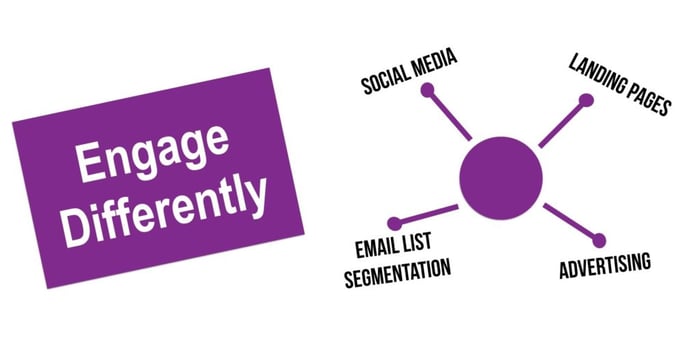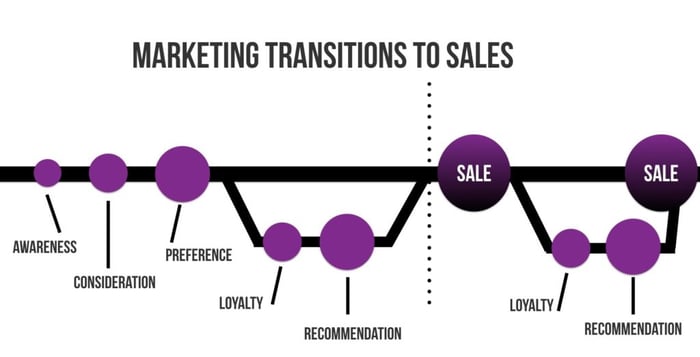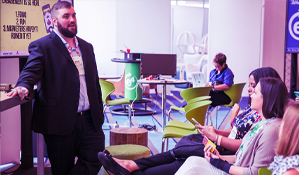By Donna Kastner on 3/8/18 1:56 PM
5 Questions for Event Marketing Strategist, Nick Borelli
With 20+ years of experience serving the events industry, Nick Borelli has earned the coveted role as trusted advisor to many event organizers and for good reason. His command of digital marketing strategies is impressive.
In any given week, you'll also find Nick sharing insights at industry events, in webinars, or in his Facebook Live Stream broadcasts. What I appreciate most about Nick is his extra-mile, go-giver style, coupled with his smart probing. He's particularly good at helping event organizers to lock in on goals first – so they can zero in on the marketing strategy best poised to deliver the results they need to achieve.
I had the chance to catch up with Nick and pick his brain on all things event marketing in the digital world.
Q1: Humanize – that's been a recurring theme in many of your talks, as you encourage event marketers to consider the individuals within their event community. Why is this important?
Nick Borelli: Everyone has access to the same marketing technologies, but some use these like traditional media. The result is often bland content with no chance to resonate because marketers are trying to reach the broadest and largest audience they can with the same messaging.
No one would talk to another person like this face to face. If you took steps to engage with people in more human ways, regardless of the medium, you'd find that your words would be stickier because they'd have a unique voice.
Before you communicate anything on behalf of your brand (event brand or otherwise), you need to know your audiences. The communities that would benefit from what you do often already know they are part of a specific community (think associations, clubs, tribes). Their behaviors also might line up with ones you've seen before (personas).
Personas are "template" people you create based on listening to those you serve and engaging with them in ways they appreciate. For events, creating communications and programming dedicated to serving personas differently allows your messaging to be less generic and more analogous to a conversation with friends. That's more along the lines of human marketing.

Q2: Can you walk us through the steps we might take to build attendee personas?
Nick Borelli: Creating personas for your event is easier when you've already produced an event, because you'll have access to previous attendee data, which serves as a guide for attendee groupings. For a first-year event, you're going to have more guess work, which means more testing and measuring to determine if your hypotheses were correct.
If you have access to previous attendee data, include as much demographic information (such as age, gender, industry, geography, etc.) as you can to identify patterns. The more information you can gather without polling the better...but there will also be polling. You should also be reading at least one marketing blog on a regular basis for a wide perspective of the industry itself. If you can connect demographic information to where they spent time at your event (sessions attended, booths visited, traffic patterns, etc.), you can then augment that data with sample polling to determine things like why they bought a ticket or even predict what they'll want for their next event experience.
Once you have behaviors paired with profile data, you should go deeper with psychographics. Truly developed persona building can only happen when you see your attendees as human beings. Creating a name and avatar, and layering in items such as values, core beliefs, and preferences will enable you to segment all marketing to those audiences in the most human of ways. Through social listening, polling, and paying attention to behaviors, you'll be able to connect with them on a much deeper level.
Q3: Attendance and revenue growth is a priority for many event organizers, but how can we be sure the growth goals we're setting are attainable?
Nick Borelli: While there are no hard-and-fast benchmarks for growth, if your event value proposition is solid, a 4-5% growth goal each year is reasonable. Keep in mind, your best benchmark data is your own. If last year's attendance was flat, a 2-3% growth goal might be more in line.
A more telling statistic that often gets overlooked is retention. If the majority of attendees aren't returning the following year, you'll need to focus more attention on experience design. Again, personas will be helpful to identify the experiences each target community appreciates. It's also smart to monitor the buyer's journey (see Marketing Transitions to Sales timeline below) to better understand at which point attendees might be engaged or dropping off.
Properly promoting your event and business with effective SEO can be a powerful tool to getting more people aware of what it is you are trying to do. Visit this website to see how keyword research can help boost your Google search ranking. This can vary for different niches and industries though. For example, SEO for Criminal Defense Lawyers would look drastically different compared to SEO for CBD. The types of content demographics need to be considered when working creating and targeting these keywords.

Q4: You're a big advocate for influencer marketing. Can you share a few best practices to embrace and a few dangerous detours to avoid?
Nick Borelli: Influencer marketing's effects are increasing for many industries and at a rate faster than most understand. Even the FCC is having a hard time regulating this form of advertising where an individual uses their personal platforms to advocate on behalf of a brand in exchange for compensation.
What we do know is that it works.
Trust is the bedrock of sales which means recommendations from credible authorities can be powerful, especially those with a dedicated following. In marketing circles, influencers have often been described as those with over 100,000 followers online and micro-influencers as those with between 10,000 and 100,000.
Micro-influencers have a stronger and faster conversion rate, but smaller audiences, although these do grow over time with assistance from companies like upleap.com. Incentivizing micro-influencers can be very effective, because they've already done the work of establishing authority that can only be gained from taking people from awareness to trust on the buyer's journey.
Again, identifying the right influencers for your event requires a deep understanding of your attendees and who they listen to. You can use software, such as BuzzSumo and Linqia as an initial gauge, but you should follow that up with research on LinkedIn and checking engagement levels on all social media platforms.
There are lots of ways you can empower influencers to advocate on your behalf. Solutions such as snöball, for example, gives influencers associated with your event personalized tools to help sell tickets. What works best is giving influencers tools, but also some freedom, because they know how to activate their followers best.
Once empowered, influencers should be fairly compensated, but it's also important to spell out expectations and measure impact to determine the evolution of the partnership. Truly ‘next level' influencers become ambassadors for your event and should have a role in designing and implementing your experience. Programs like that are transparent and understand that taste makers represent the voice of the personas who identify with them.
Q5: At EnVision, you're leading a session titled "Being Your Authentic Self," where you explore personal branding. How does this come into play?
Nick Borelli: Being your authentic self is less about being a maverick that beats to a drum only you can hear. Instead, it's about sharing your passion in a way that attracts others.
With personal mission, vision and values established for yourself, you can then apply this to your own history and tastes to appeal to those with similar attributes. Being true to your authentic self means that you recognize your message won't land with some people. For those it does reach, it will be truer and deeper.
When you know who you are, you can then shout to the world in everything you do. Others will remember you as the _____ authority, not because you know all there is to know about that subject, but because they believe you are personally invested in this specialty. Long-term personal branding isn't based on manipulative trickery – it's focused on hard-earned expertise. Authority articulated and shared with your own true voice will ensure you are memorable, valuable to others, and content.
Want more marketing insights from Nick Borelli? Check out his website: www.nickborelli.com

Donna Kastner has spent a good portion of her career as an event experience design consultant and is now building a dynamic collaboration community for executives age 50+ who are striving to make a smooth segue from full-time job to part-time consulting gig. As the founder of Retirepreneur, Donna’s championing a movement to help others design flexible and fulfilling encore career opportunities.


comments